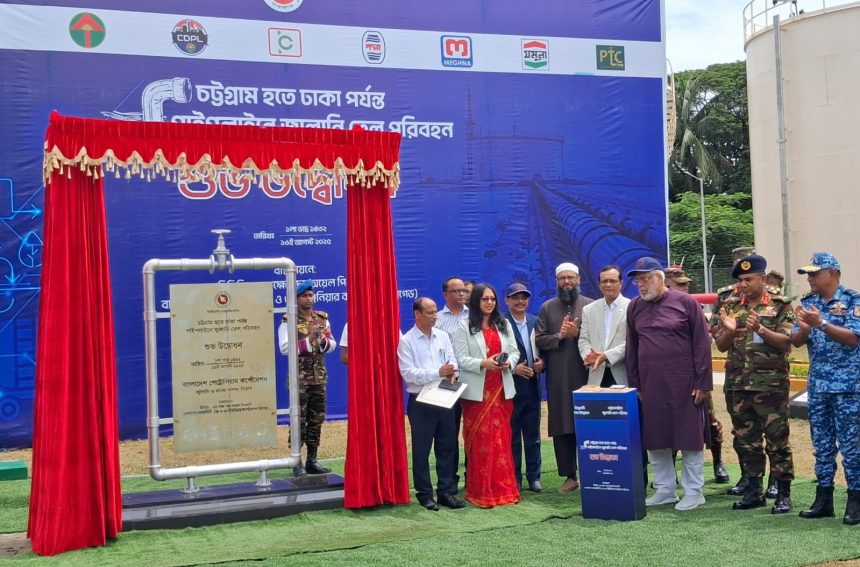Energy adviser Muhammad Fouzul Kabir Khan highlighted on Saturday that while project costs inevitably rise due to delays, the roads, power and energy, and railways ministries have managed to save around Tk 45,000 crore through efficient measures.
Fouzul made these remarks during the inauguration of Chattogram-Dhaka oil transportation operations through the newly launched pipeline from Padma Oil Company’s Despas Terminal in the port city’s Patenga area. Oil transfer has already begun through this pipeline system.
“The 249.42-kilometer pipeline project, originally scheduled for completion in 2018 or 2020, faced setbacks due to the Covid-19 pandemic and other reasons, leading to increased expenses,” Fouzul said.
He emphasized, “Any project must create its own value addition. If we fail to develop the capacity to add value ourselves, we will remain dependent on foreign firms. How long will Chinese and Indian companies continue implementing our projects?”
Fouzul also pointed out that limited national resources are not being fully utilized due to corruption and mismanagement. “If we can reduce corruption and wastage, our economic growth will increase further. Already, through efficiency measures, about Tk 45,000 crore has been saved by the roads, power and energy, and railways ministries,” he added.
After the inauguration, Fouzul Kabir Khan planted trees and visited the Despas Terminal. He later participated in a discussion meeting attended by officials from the Bangladesh Army, Bangladesh Petroleum Corporation (BPC), and other organizations.
Currently, the system loss stands at 0.17 per cent, but according to the BPC, the highest system loss of oil supplied through the pipeline system will only be 0.05 per cent.
“This is the international standard of acceptable system loss for petroleum products, which we are following. We are planning to reduce this system loss even further,” BPC chairman Amin Ul Ahsan told TIMES of Bangladesh.
BPC supplies about 6 million tonnes of fuel annually, of which 4.6 million tonnes are diesel, and the rest include petrol, octane, jet fuel, and other petroleum products. These products are typically transported across the country by road, waterways, and rail through three oil marketing companies – Padma, Meghna, and Jamuna.
Two million tons of diesel will now be supplied through the Chattogram-Dhaka pipeline, which is about a third of the total supply. The supply capacity of the pipeline is around three million tonnes, with the possibility of expanding to five million tonnes in the future.
Construction of the pipeline began in 2018 with a cost of Tk 3,653 crore from BPC’s own fund. This pipeline project was designed to supply fuel from Chattogram, the country’s main energy hub, to Dhaka and surrounding districts, which account for half of the country’s total energy consumption.
The project began in 2018 with an initial budget of Tk 2,861 crore approved by the Executive Committee of the National Economic Council (ECNEC) and was expected to be completed by December 2020. Delays extended the timeline and raised the cost to Tk 3,699 crore. It was funded by the BPC and implemented by the Bangladesh Army’s 24 Engineering Construction Brigade.
The infrastructure includes a 16-inch diameter pipeline from Chattogram to Godnail, an 8.29-kilometer 10-inch pipeline from Godnail to Fatullah, and nine stations along the route. The pipeline crosses 22 rivers and canals and requires 286.88 acres of land.
Three storage tanks with a combined capacity of 90,000 tonnes have been installed for BPC’s marketing companies – Padma, Meghna, and Jamuna. A modern automatic depot has been built in Mogbari, under Cumilla’s Barura upazila, to facilitate supply from Chattogram via Feni, Cumilla, Chandpur, and Munshiganj.


